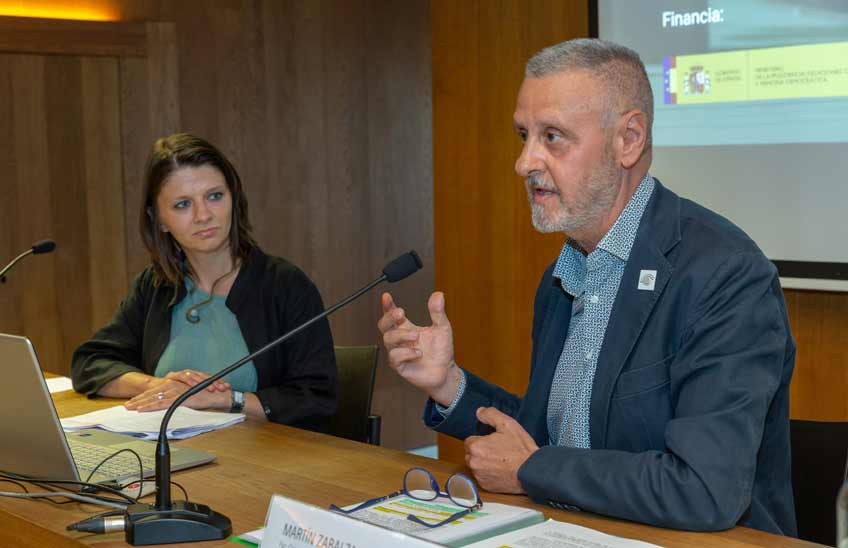"In order to preserve and guard the historical report it is essential for families to collect the testimonies of their elders"
Anna Dulska, researcher at project 'España XYZ' of the University, assures that "in the young generation there is a distancing from the past, but at the same time a polarization".

FotoCedida<br>/Anna Dulska, investigadora del ICS de la Universidad de Navarra, y Martín Zabalza Arregui, director General de Paz, Convivencia y Derechos Humanos del Gobierno de Navarra.
21 | 06 | 2023
"In order to preserve and guard the historical report it is essential that families collect the testimonies of their elders". This was stated by Anna Dulska, researcher of the Institute for Culture and Society (ICS) of the University of Navarra, on the occasion of the presentation of the results of the project 'Spain XYZ'. The event took place yesterday at the Palacio del Condestable and was attended by Martin Zabalza Arregui, director General of Peace, Coexistence and Human Rights of the Government of Navarra.
For Anna Dulska, "talking about report, post-memory and history in order to build a truly democratic historical report from below is urgent". As she observed, in the younger generations "there is a distancing from the past, but at the same time, a polarization, whose background is distorted". For this reason, he called for public policies at report that have the effect of "getting children, grandchildren and great-grandchildren interested in asking their elders how they experienced certain historical events".
"Neither the law, nor politics, nor Education have been able to open the door to true reconciliation," insisted the ICS researcher. In her opinion, starting with the families is necessary to take this step: "It is about giving a voice to those who suffered the worst of the armed conflict and, once it was over, decided to turn the page".
The study, funded by the Ministry of the Presidency, Relations with the Courts and Democratic report , analyzes the perception and transmission of Spain's recent history. "In the face of generational change, there is a shift from the direct recollection of witnesses to what is remembered by others who have not experienced the events," said Dulska.
Political agency vs. social diary
"That is to say," he added, "there is the passage from report to post-memory, or rather to the different versions of history that come from second or third voices or generations, whether from relatives or the State, transmitted fundamentally through schooling.
As part of project , interviews were conducted with members of different families, who then participated in focus groups grouped by generations. "The most surprising thing was the leave response we received to the call for participation, even though we reached more than a million people. We think that citizens are not willing to talk about the past," he explained. In this sense, he stated that "the political diary , which makes visible the issues related to the historical and democratic report , differs from the social diary ".
The researcher has regretted that in Spain no oral history programs of study has been carried out with the witnesses of the Civil War, on a scale similar to what was done, for example, with the survivors of the Holocaust after the Second World War. "In this way we have irreversibly lost a multitude of testimonies," he concluded.
